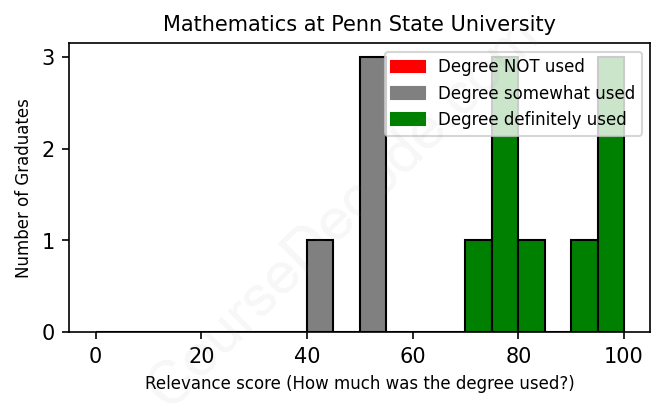
First, some facts. Of the Mathematics graduates from Penn State University we've analyzed , here's how many have used (or NOT used) their degree in their career:

These are estimates based on AI analysis of 13 LinkedIn profiles (see below).
The verdict? Above average. Overall, with an average relevance score of 74%, Mathematics graduates from Penn State University have a higher likelihood (+7%) of finding work in this field compared to the average graduate across all fields:
And for comparison, here's the chart for all profiles we've looked at across all degrees.
Also, after graduating, 38% of these graduates have pursued further education other than another Bachelor's degree (such as a Masters degree or other), compared to the average across all profiles of 35%. This suggests you may need more than just a Bachelors degree to be competitive as a Mathematics graduate.
See the details:
|
Relevance score: 50% We think this person has gone into a career only somewhat relevant to their degree. We think this person has gone into a career only somewhat relevant to their degree.
DEGREE INFOGraduated in 2012 from Penn State University with a Bachelor of Science (BS) in Mathematics. No other secondary education since. JOB HISTORY SINCE GRADUATIONAccounting Analyst BNY Mellon Aug 2012 - Present ABOUTNo information provided. |
The top 10 most common jobs done by the graduates we've analyzed (ranked most common to least) are:
When looking at the job outcomes for folks who graduated with a Mathematics degree from Penn State University, it seems that many of them wound up in roles that either directly leverage their math skills or at least benefit from them in some way. A number of graduates moved into financial roles, such as Cost Analysts and Financial Analysts, where the ability to analyze numbers and costs is key. These jobs, especially for those at higher levels like Cost Chief or Senior Financial Analyst, really lean into the advanced math skills these graduates acquired during their studies. Other roles in data analysis and consulting, like those at KPMG and various analyst positions, also reflected a strong relevance to their mathematical training, particularly in data modeling and quantitative analysis, which are all about using math to solve problems.
However, it’s not all rainbows and butterflies in the math relevance department. Many graduates found themselves in positions where math wasn’t the focus at all. You have graduates who became camp counselors, waitstaff, or even operations managers, where their duties were more about management or customer service than crunching numbers. So, while many did end up in jobs that relate closely to their degree, there’s a noticeable portion that strayed into fields where the direct application of mathematical knowledge wasn’t a major component of their day-to-day tasks. It just goes to show that even in a technical field like mathematics, there’s a wide variety of career paths people can take!
Here is a visual representation of the most common words in job titles for Mathematics graduates (this is across all Mathematics graduates we've analyzed, not just those who went to Penn State University):

Graduates from Penn State University with a degree in Mathematics seem to generally follow a solid career trajectory that often leads to positions relevant to their field of study. Many of the early jobs for graduates in the years immediately after leaving Penn State include roles like Analysts, Managers, or even specialized positions such as Financial Analysts and Cost Analysts. For instance, graduates from 2011 have built impressive careers within organizations like the Air Force Life Cycle Management Center, moving from a Cost Analyst to a Cost Chief over the years. Similarly, graduates from 2015 to 2020 have often started in more general roles, such as Business Analyst or Project Manager, but quickly transitioned to positions that utilize more analytical skills and mathematical knowledge.
As they progress five to ten years down the line, these graduates typically ascend to more senior and specialized roles, often in analysis, finance, or data science. By that time, many have climbed the ranks to become Senior Financial Analysts or even Project Managers, reflecting their growth in responsibility and expertise. A few have ventured into other areas, like actuarial science or data consulting, reinforcing the versatility of a Mathematics degree. While there are some cases where graduates have taken less direct routes, such as working in hospitality or banking initially, the larger trend suggests that Penn State Math graduates generally find their footing in reputable and relevant careers that leverage their skills and education. Overall, it paints a positive picture of the outcomes for students pursuing mathematics at Penn State, showing that with time and experience, they can build fulfilling careers in their field.
Honestly, a Bachelor’s degree in Mathematics can be pretty challenging, and Penn State is no exception. You'll dive deep into concepts that can get pretty abstract, like real analysis and abstract algebra, which might make your head spin at times. You’ll definitely need to be comfortable with problem-solving and logical thinking because a lot of the coursework is rigorous and requires a solid grasp of both theory and application. That said, if you enjoy math and have a good foundation from high school, it’s totally doable, but be prepared to put in some serious study time! Overall, it’s more on the challenging side compared to many other majors, but if you’re passionate about the subject, it can also be a rewarding experience.
Most commonly, in the LinkedIn profiles we've looked at, it takes people 4 years to finish a Bachelor degree in Mathematics.
Looking at these Penn State grads, it seems like many have been able to snag decent jobs right after graduating, and many of them have worked their way up in their fields, which is a good sign for their salaries. For example, those in finance, analytics, and management roles, especially in companies like KPMG and Aetna, typically earn pretty good money. Others who started in military roles or technical positions also seem to be moving into higher-level roles, which usually come with better pay. While there might be some variation depending on their specific roles, overall, these grads seem to be doing well financially as they make solid career moves post-Penn State.
Here is a visual representation of the most common words seen in the "about" section of LinkedIn profiles who have a Bachelor degree in Mathematics (this is across all Mathematics graduates we've analyzed, not just those who went to Penn State University). This may or may not be useful:

Here are all colleges offering a Bachelor degree in Mathematics (ordered by the average relevance score of their Mathematics graduates, best to worst) where we have analyzed at least 10 of their graduates:
| College | Score | Count |
|---|---|---|
 University of Florida University of Florida
|
83 | 11 |
 Penn State University Penn State University
|
74 | 13 |
 The University of Texas at Austin The University of Texas at Austin
|
68 | 23 |
 University of Washington University of Washington
|
68 | 27 |
 University of California, Berkeley University of California, Berkeley
|
66 | 10 |
 University of Minnesota-Twin Cities University of Minnesota-Twin Cities
|
65 | 15 |
 California Polytechnic State University-San Luis Obispo California Polytechnic State University-San Luis Obispo
|
64 | 11 |
 University of North Texas University of North Texas
|
51 | 11 |
 University of California, Riverside University of California, Riverside
|
44 | 11 |